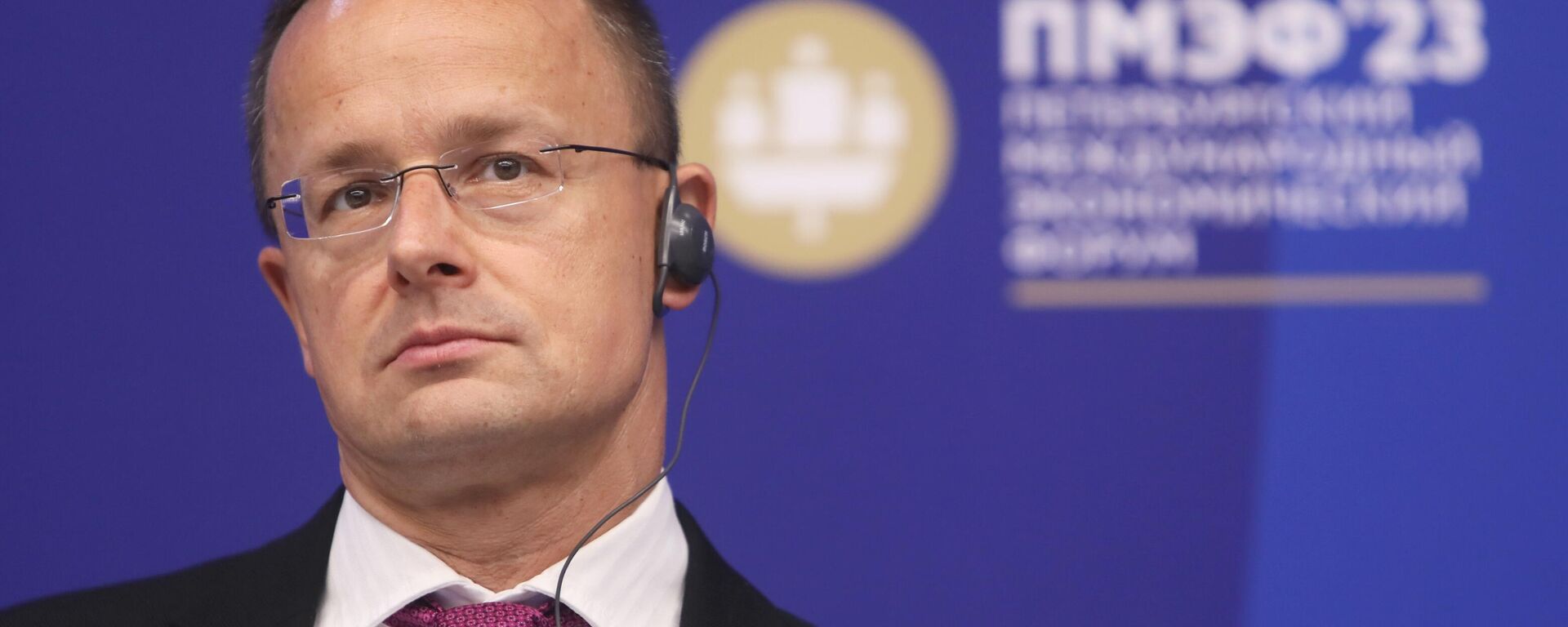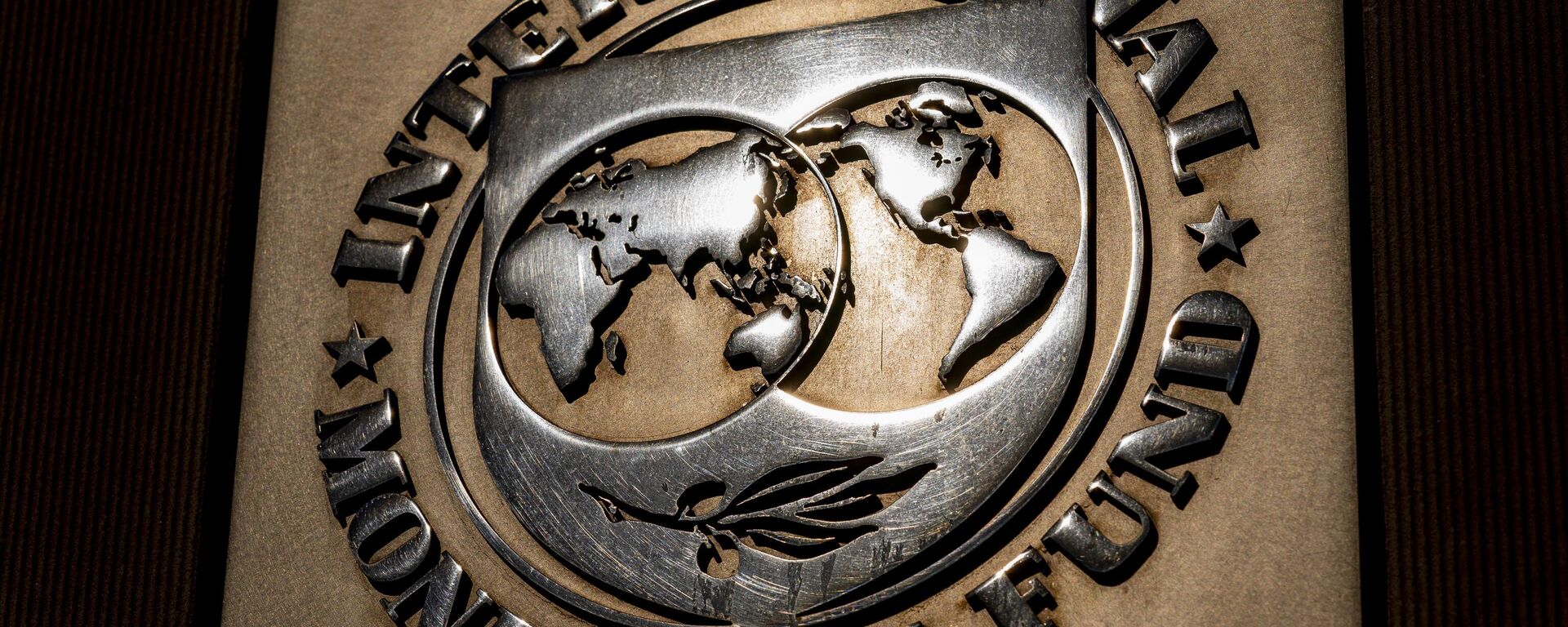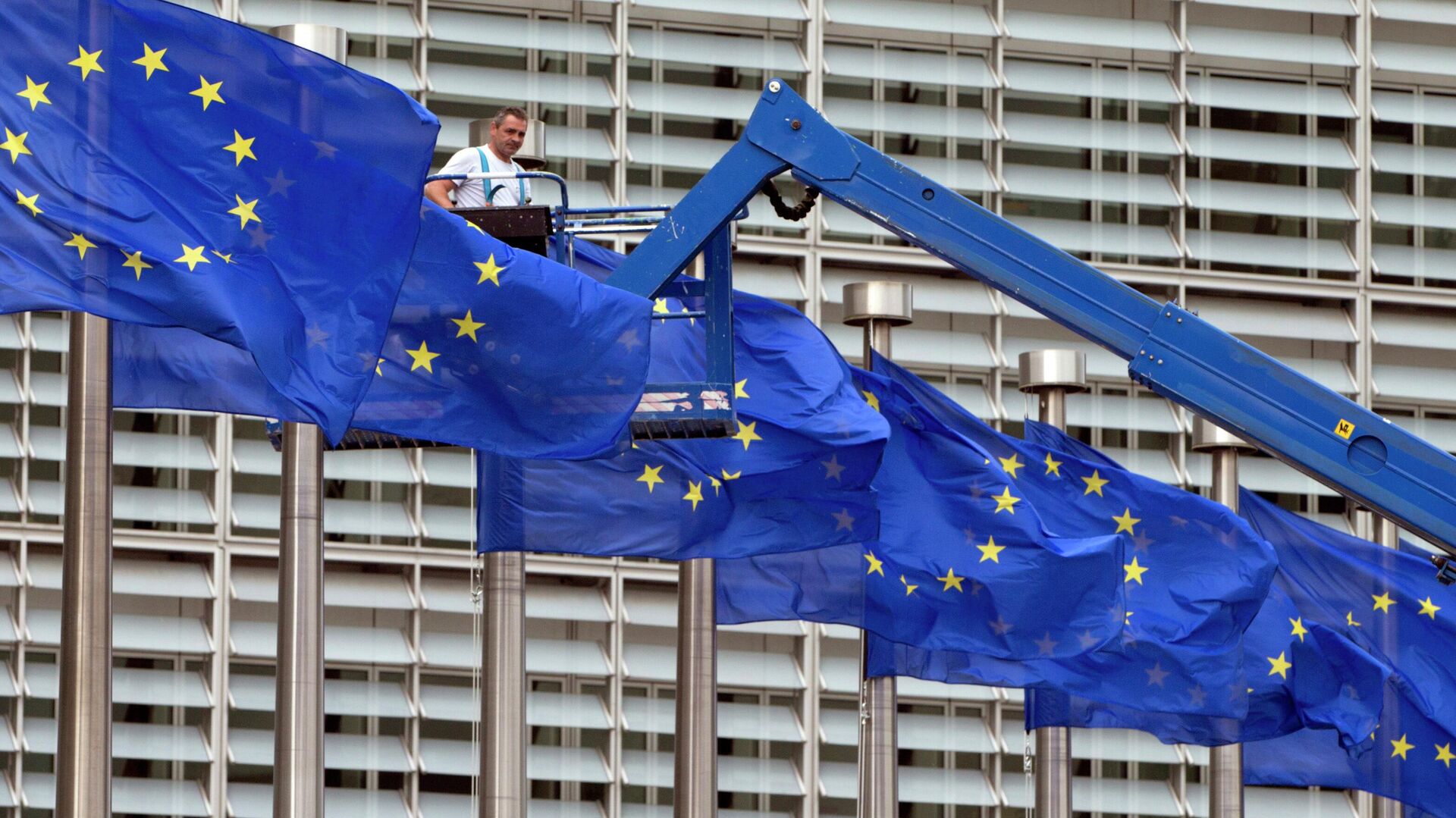https://sputnikglobe.com/20231201/eu-countries-resist-no-russia-clause-in-12th-sanctions-package-1115324356.html
EU Countries Resist 'No Russia Clause' in 12th Sanctions Package
EU Countries Resist 'No Russia Clause' in 12th Sanctions Package
Sputnik International
The under-review proposal compels EU exporters to adopt a prohibition on re-exporting to Russia, covering all goods in the Commission's customs codes, extending to items beyond military use. This measure, however, risks negative repercussions on the EU's international trade and may be counterproductive.
2023-12-01T12:32+0000
2023-12-01T12:32+0000
2023-12-01T12:32+0000
world
maria zakharova
vladimir putin
germany
france
russia
european union (eu)
world bank
organisation for economic cooperation and development (oecd)
international monetary fund
https://cdn1.img.sputnikglobe.com/img/07e6/06/03/1095961953_0:0:3133:1762_1920x0_80_0_0_620632a3e3f7ba87b9eb41fda1482ef7.jpg
The European Union's latest proposal for its 12th sanctions package against Russia is facing stiff resistance from several member states. Sources familiar with the matter say concerns are being raised about the potential impact of these new measures on the EU's global trade and their overall effectiveness in the current geopolitical climate.The so-called "No Russia clause" aims to restrict any funds transfer by Russian entities or nationals residing in Russia outside of the EU. One of the suggested measures mandates EU exporters to include a re-export prohibition to Russia for all goods listed in the commission's customs codes. Additionally, the EU is considering adding specific metals and liquefied petroleum gas (LPG) to its sanctions list. However, most of the bloc's members have apparently frowned at such measures, disparaging such actions as needlessly cumbersome and lacking exemption thresholds for minor transactions.In response to the complexity of implementing these sanctions, the EU has considered extending the initial three-month wind-down period to one year for some iron products and LPG.Reports indicate there are efforts to secure exemptions for Russian steel within the EU. This contrasts with the European Commission's approach, drawing contradictions between member countries. This situation is highlighted by the reliance on Russian aluminum wire rods, which are vital for renewable energy projects and are heavily imported by countries like Poland, Spain, and Italy. A recent Ipsos survey for French Secours Populaire, involving 10,000 Europeans, indicates that rising prices have put nearly a third of Europeans in a difficult financial situation, with 29 percent unable to manage unexpected expenses. About half expect future financial instability due to inflation and stagnant wages. Many are forced to make tough choices like skipping meals, particularly in Greece and Moldova. Over half are concerned about inflation, 62 percent worry about rising food costs, and 59 percent are apprehensive about unexpected expenses and gas prices. Additionally, a survey in June by the Joseph Rowntree Foundation shows that 5.7 million low-income UK households are struggling to afford enough food, highlighting a widespread economic challenge in Europe.The international rating agency S&P Global has observed an accelerating decline in European GDP, signaling a looming recession. Compounding these issues, several EU countries are grappling with high government debt-to-GDP ratios. France's debt stands at over 112 percent of its GDP, with other countries like Greece, Italy, Portugal, Spain, and Belgium also showing significantly high ratios, above 100 percent.Historically, Germany and France have been critical drivers of the European Union's production, but this dynamic is changing as major manufacturers consider relocating to non-EU economies. In September, Deutsche Bank CEO Christian Sewing expressed to an audience that Germany risks becoming the "sick man of Europe" without addressing structural weaknesses. He highlighted problems like high energy costs, outdated infrastructure, and skilled worker shortages. Sewing added that Germany's strong manufacturing sector has struggled due to energy issues since the Ukraine conflict began, when it stopped the flow of Russian gas - once the lifeline of its economy. An international economics institute reports that the European Union's initial 11 sanctions packages against Russia have led to a moderate market loss for France's 145,000 exporters, particularly impacting those in the transportation equipment, chemicals, and machinery sectors. The sanctions have affected 2,436 French companies, with the most significant numbers in machinery, chemicals, and transportation. Transport sector companies have borne nearly half of the total four billion euros in losses that French businesses have incurred due to these EU sanctions.Maria Zakharova, spokeswoman for the Russian Foreign Ministry, has condemned the West's proposed 12th package of anti-Russian sanctions as an aggressive breach of international law, warning that Russia would respond. She asserted that these measures, trying to target unsanctioned sectors of the Russian economy, are not new and are rather expected by Russia. Zakharova emphasized that the European Union's actions against Russia would be met with retaliation, indicating a persistent stance of counteraction from Russia.On November 1, 2023, President Vladimir Putin, during an economic meeting against the backdrop of reports about the imminent introduction of a 12th anti-Russian sanctions package, stated that “Over the nine months of this year, Russia’s GDP grew by 2.8% compared to the same period last year. Including in August and September, it increased by 5.2%...I would especially like to highlight sectors with good added value — the production of machinery, equipment, and machinery.” Putin highlighted the continuous growth in economic indicators, with unemployment remaining low, at roughly three percent, and a 7.5 percent rise in pay scales.Despite sanctions, Russia's economy has shown unexpected growth, leading to upward revisions in forecasts by international financial institutions. The IMF initially predicted a 0.3 percent growth in Russia's GDP for this year, later increasing it to 1.5 percent in July and 2.2 percent in October. The World Bank, initially expecting a 0.2 percent decline, now predicts a 1.6 percent growth by year's end and a further 1.3 percent increase in 2024. The OECD's predictions align with this positive trend.
https://sputnikglobe.com/20231015/sanctions-failed-eu-expectation-to-bring-russian-economy-to-its-knees---hungarian-foreign-minister-1114205889.html
https://sputnikglobe.com/20231010/imf-raises-russia-2023-growth-forecast-by-07-points-to-22-1114058881.html
germany
france
russia
Sputnik International
feedback@sputniknews.com
+74956456601
MIA „Rosiya Segodnya“
2023
Chimauchem Nwosu
https://cdn1.img.sputnikglobe.com/img/07e7/09/01/1113046371_0:99:1536:1635_100x100_80_0_0_9c5c627283eca931c39fe4852bbb301c.jpg
Chimauchem Nwosu
https://cdn1.img.sputnikglobe.com/img/07e7/09/01/1113046371_0:99:1536:1635_100x100_80_0_0_9c5c627283eca931c39fe4852bbb301c.jpg
News
en_EN
Sputnik International
feedback@sputniknews.com
+74956456601
MIA „Rosiya Segodnya“
Sputnik International
feedback@sputniknews.com
+74956456601
MIA „Rosiya Segodnya“
Chimauchem Nwosu
https://cdn1.img.sputnikglobe.com/img/07e7/09/01/1113046371_0:99:1536:1635_100x100_80_0_0_9c5c627283eca931c39fe4852bbb301c.jpg
european union, 12th sanctions package, russia, global trade, geopolitical climate, no russia clause, funds transfer, russian entities, eu member states, economic impact, eu economy, international law, market loss, french exporters, maria zakharova, russian foreign ministry, sanctions retaliatory measures, economic growth, vladimir putin, gdp growth, unemployment rate, imf forecasts for russia, world bank predictions, oecd, economic indicators.
european union, 12th sanctions package, russia, global trade, geopolitical climate, no russia clause, funds transfer, russian entities, eu member states, economic impact, eu economy, international law, market loss, french exporters, maria zakharova, russian foreign ministry, sanctions retaliatory measures, economic growth, vladimir putin, gdp growth, unemployment rate, imf forecasts for russia, world bank predictions, oecd, economic indicators.
EU Countries Resist 'No Russia Clause' in 12th Sanctions Package
The under-review proposal would compel EU exporters to adopt a prohibition on re-exporting to Russia, covering all goods in the commission's customs codes, extending to items beyond military use. This measure, however, risks negative repercussions on the EU's international trade and is seen as counterproductive by member states.
The European Union's latest proposal for its 12th sanctions package against Russia is facing stiff resistance from several member states. Sources familiar with the matter say concerns are being raised about the potential impact of these new measures on the EU's global trade and their overall effectiveness in the current geopolitical climate.
The so-called "No Russia clause" aims to restrict any funds transfer by Russian entities or nationals residing in Russia outside of the EU. One of the suggested measures mandates EU exporters to include a re-export prohibition to Russia for all goods listed in the commission's customs codes. Additionally, the EU is considering adding specific metals and liquefied petroleum gas (LPG) to its sanctions list. However, most of the bloc's members have apparently frowned at such measures, disparaging such actions as needlessly cumbersome and lacking exemption thresholds for minor transactions.
In response to the complexity of implementing these sanctions, the EU has considered extending the initial three-month wind-down period to one year for some iron products and LPG.

15 October 2023, 03:04 GMT
Reports indicate there are efforts to secure exemptions for Russian steel within the EU. This contrasts with the European Commission's approach, drawing contradictions between member countries. This situation is highlighted by the reliance on
Russian aluminum wire rods, which are vital for renewable energy projects and are heavily imported by countries like Poland, Spain, and Italy.
A recent Ipsos survey for French Secours Populaire, involving 10,000 Europeans, indicates that rising prices have put nearly a third of Europeans in a difficult financial situation, with 29 percent unable to manage unexpected expenses. About half expect future financial instability due to inflation and stagnant wages. Many are forced to make tough choices like skipping meals, particularly in Greece and Moldova. Over half are concerned about inflation, 62 percent worry about rising food costs, and 59 percent are apprehensive about unexpected expenses and gas prices. Additionally, a survey in June by the Joseph Rowntree Foundation shows that 5.7 million low-income UK households are struggling to afford enough food, highlighting a widespread economic challenge in Europe.
The international rating agency S&P Global has observed an accelerating decline in European GDP, signaling a looming recession. Compounding these issues, several EU countries are grappling with high government debt-to-GDP ratios. France's debt stands at over 112 percent of its GDP, with other countries like Greece, Italy, Portugal, Spain, and Belgium also showing significantly high ratios, above 100 percent.
Historically, Germany and France have been critical drivers of the European Union's production, but this dynamic is changing as major manufacturers consider relocating to non-EU economies. In September, Deutsche Bank CEO Christian Sewing expressed to an audience that Germany risks
becoming the "sick man of Europe" without addressing structural weaknesses. He highlighted problems like high energy costs, outdated infrastructure, and skilled worker shortages. Sewing added that Germany's strong manufacturing sector has struggled due to energy issues since the Ukraine conflict began, when it stopped the flow of Russian gas - once the lifeline of its economy.
An international economics institute reports that the
European Union's initial 11 sanctions packages against Russia have led to a moderate market loss for France's 145,000 exporters, particularly impacting those in the transportation equipment, chemicals, and machinery sectors. The sanctions have affected 2,436 French companies, with the most significant numbers in machinery, chemicals, and transportation. Transport sector companies have borne nearly half of the total four billion euros in losses that French businesses have incurred due to these EU sanctions.

10 October 2023, 09:08 GMT
Maria Zakharova, spokeswoman for the Russian Foreign Ministry, has condemned the West's proposed 12th package of anti-Russian sanctions as an aggressive breach of international law, warning that Russia would respond. She asserted that these measures, trying to target unsanctioned sectors of the Russian economy, are not new and are rather expected by Russia. Zakharova emphasized that the European Union's actions against Russia would be met with retaliation, indicating a persistent stance of counteraction from Russia.
On November 1, 2023, President Vladimir Putin, during an economic meeting against the backdrop of reports about the imminent introduction of a 12th anti-Russian sanctions package, stated that “Over the nine months of this year, Russia’s GDP grew by 2.8% compared to the same period last year. Including in August and September, it increased by 5.2%...I would especially like to highlight sectors with good added value — the production of machinery, equipment, and machinery.” Putin highlighted the continuous growth in economic indicators, with unemployment remaining low, at roughly three percent, and a 7.5 percent rise in pay scales.
Despite sanctions, Russia's economy has shown unexpected growth, leading to upward revisions in forecasts by international financial institutions. The IMF initially predicted a 0.3 percent growth in Russia's GDP for this year, later increasing it to 1.5 percent in July and 2.2 percent in October. The World Bank, initially expecting a 0.2 percent decline, now predicts a 1.6 percent growth by year's end and a further 1.3 percent increase in 2024. The OECD's predictions align with this positive trend.







